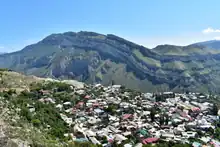42°23′12″N 46°57′42″E / 42.38667°N 46.96167°E

.jpg.webp)
Gunib (Avar: Гъуниб), also spelled Ghunib,[1] is a rural locality (a selo) and the administrative center of Ghunib District of the Republic of Daghestan. Population: 2,406 (2002 Census);[2] 2,405 (1989 Census).[3] After the dissolution of the Soviet Union, the population of Gunib went into decline. Only in 2014 did it reach its Soviet-era population again.
History
Ghunib was historically important as a natural fortress during the Caucasian War of the 19th century. Imam Shamil, leader of the Chechen and Daghestani tribes, made his last stand against the Russians at Ghunib, where he gave himself up to the Russian commander, Prince Alexander Baryatinsky, on 25 August 1859. The name is derived from the Avar word Guni-meer which translates to heap of stones. Olga Forsh was born in Ghunib in 1873.
In 1895, the town housed the barracks of the Samur regiment and the Terek-Dagestan fortress artillery, and grew into a self-sufficient entity with merchants, conscripts, an Orthodox church, and a post office. During the Russian Empire, the settlement was the administrative capital of the Gunibsky Okrug.
References
- ↑ e.g., Francis Galton, Vacation Tourists and Notes of Travel in 1860 [1861, 1862-3], Vol. 3, p. 81; Moshe Gammer, Muslim Resistance to the Tsar: Shamil and the Conquest of Chechnia and Daghestan (Taylor & Francis, 2003; ISBN 0714681415), p. 277.
- ↑ Russian Federal State Statistics Service (May 21, 2004). Численность населения России, субъектов Российской Федерации в составе федеральных округов, районов, городских поселений, сельских населённых пунктов – районных центров и сельских населённых пунктов с населением 3 тысячи и более человек [Population of Russia, Its Federal Districts, Federal Subjects, Districts, Urban Localities, Rural Localities—Administrative Centers, and Rural Localities with Population of Over 3,000] (XLS). Всероссийская перепись населения 2002 года [All-Russia Population Census of 2002] (in Russian).
- ↑ Всесоюзная перепись населения 1989 г. Численность наличного населения союзных и автономных республик, автономных областей и округов, краёв, областей, районов, городских поселений и сёл-райцентров [All Union Population Census of 1989: Present Population of Union and Autonomous Republics, Autonomous Oblasts and Okrugs, Krais, Oblasts, Districts, Urban Settlements, and Villages Serving as District Administrative Centers]. Всесоюзная перепись населения 1989 года [All-Union Population Census of 1989] (in Russian). Институт демографии Национального исследовательского университета: Высшая школа экономики [Institute of Demography at the National Research University: Higher School of Economics]. 1989 – via Demoscope Weekly.